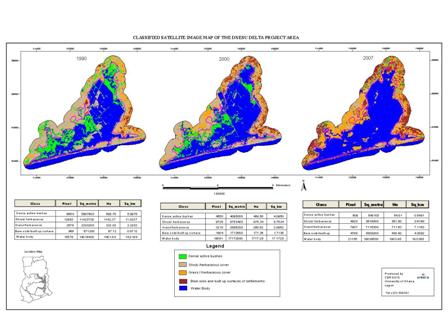 Densu Delta.
Densu Delta.
The Densu Delta Ramsar site is comprised of an open lagoon, salt pans, freshwater marsh and scrub and sand dunes. It is important for species of resident and migratory waterbirds.
| Release date | 04/09/2010 |
|---|---|
| Contributor | Eric Okoree |
The Densu delta wetland is located at about
11km west of Accra and comprises of an open lagoon, salt pans, freshwater marsh
and scrub and sand dunes. A greater part
of the land is owned by the Panbros Salt Company. The wetland is fed mainly by the Densu River,
which is dammed upstream (Weija Dam), to supply water to the city of
Accra. This dam has had profound effect
on the lagoon and general hydrology of the wetland, since freshwater inflow
into the wetland is controlled by the management of the Ghana Water Company at Weija
Water Works.
Prior to the designation of the site
as a Ramsar Site in 1992, the Densu Delta comprised of 6.0ha of dense active
bushes, 11.42ha shrub/herbaceous cover, 2.32ha of grass/herbaceous cover,
0.97ha of bare soil or built up area and 14.02 ha of water body. Analysis of GIS images (Fig 1), indicated a sharp decline in the extent of
dense active bushes and shrub and a corresponding increase in the extent of
bare or built up area in the wetland.
Habitat degradation through persistent removal of woody vegetation over
the years has resulted in coverage of dense woody vegetation at the delta
declining from a total of 6.0 ha in 1990 to 0.55 ha in 2007. Consequent to the loss of woody vegetation
cover, the extent of water body increased remarkably from 14.02 ha in 1990 to
19.04 ha in 2007. The decline in the
extent of woody vegetation cover and the increase in the area of open water
could be attributed to the systematic expansion of the activities of the
Panbross Salt Industries. Similarly,
encroachment for housing development increased the extent of bare and built up
area from a low of 0.87 ha throughout the wetland in 1990 to 4.30ha in 2007. There are human settlements all around the
wetland, a situation that has been compounded in recent times by the need for
land for housing within the Accra metropolitan area.
Intensification of the salt mining
activities and the persistent encroachment of the wetland for housing
development appear to be exerting huge negative impact on the ecological
condition of the wetland. This is
manifested in the rampant variation in the population and species of migrant
and resident waterbirds that roost at the site.
The loss of woody vegetation cover and an increase in the bare and built
up area at the wetland imply an aggregate loss of critical habitats such as breeding
sites of resident water birds ( e.g. herons, long-tailed cormorant).
Densu Delta wetland is important for species of resident and migratory waterbirds. Sixty species of waterbirds have been recorded at this site with an estimated population of some 35,000 birds, including globally important numbers of eight species (Tringa erythropus, Sterna maxima, Sterna sandvicensis, Sterna dougallii, Sterna hirundo, Sterna albifrons, Chlidonias niger and Egretta garzetta gularis). The site is particularly important for roosting terns and is the second most important site for the rare Sterna dougallii. In addition to the species occurring in globally important numbers, the site supports significant populations of Calidris ferruginea, C.minuta, Charidrius hiaticula and Egretta garzetta garzetta. Three species Glareola pratincola, Himantopus himantopus and Sterna albifrons breed regularly at the site. The proximity to Accra and easy access around the site as result of the salt pan construction make the site attractive for bird watching. Three species of marine turtles Lepidochelys olivacea, Chelonia mydas and Dermochelys coriacea have been recorded nesting on the beach front of the site.
The main threat is urbanization, with uncontrolled and unauthorized housing development, resulting in complete habitat destruction and loss of the greater part of the floodplain and marshlands that were important for waders.
Satelite Image Map of the Densu Delta Area

